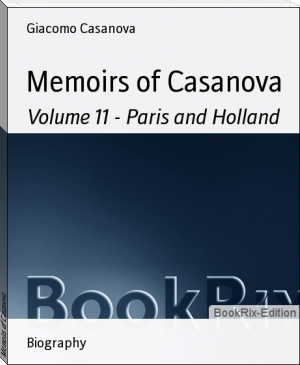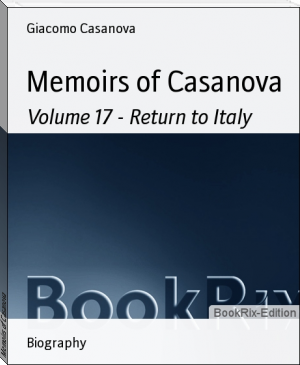The Complete Memoirs of Jacques Casanova de Seingalt by Giacomo Casanova (list of e readers .txt) 📕

- Author: Giacomo Casanova
- Performer: -
Book online «The Complete Memoirs of Jacques Casanova de Seingalt by Giacomo Casanova (list of e readers .txt) 📕». Author Giacomo Casanova
A few days later two Capuchins came to visit him at noon. They did not go, and as he did not care to dismiss them, dinner was served without any place being laid for the friars. Thereupon the bolder of the two informed the count that he had had no dinner. Without replying, the count had him acommodated with a plateful of rice. The Capuchin refused it, saying that he was worthy to sit, not only at his table, but at a monarch's. The count, who happened to be in a good humour, replied that they called themselves "unworthy brethren," and that they were consequently not worthy of any of this world's good things.
The Capuchin made but a poor answer, and as I thought the count to be in the right I procceded to back him up, telling the friar he ought to be ashamed at having committed the sin of pride, so strictly condemned by the rules of his order.
The Capuchin answered me with a torrent of abuse, so the count ordered a pair of scissors to be brought, that the beards of the filthy rogues might be cut off. At this awful threat the two friars made their escape, and we laughed heartily over the incident.
If all the count's eccentricities had been of this comparatively harmless and amusing nature, I should not have minded, but such was far from being the case.
Instead of chyle his organs must have distilled some virulent poison; he was always at his worst in his after dinner hours. His appetite was furious; he ate more like a tiger than a man. One day we happened to be eating woodcock, and I could not help praising the dish in the style of the true gourmand. He immediately took up his bird, tore it limb from limb, and gravely bade me not to praise the dishes I liked as it irritated him. I felt an inclination to laugh and also an inclination to throw the bottle at his head, which I should probably have indulged in had I been twenty years younger. However, I did neither, feeling that I should either leave him or accommodate myself to his humours.
Three months later Madame Costa, the actress whom he had gone to see at Gorice, told me that she would never have believed in the possibility of such a creature existing if she had not known Count Torriano.
"Though he is a vigorous lover," she continued, "it is a matter of great difficulty with him to obtain the crisis; and the wretched woman in his arms is in imminent danger of being strangled to death if she cannot conceal her amorous ecstacy. He cannot bear to see another's pleasure. I pity his wife most heartily."
I will now relate the incident which put an end to my relations with this venomous creature.
Amidst the idleness and weariness of Spessa I happened to meet a very pretty and very agreeable young widow. I made her some small presents, and finally persuaded her to pass the night in my room. She came at midnight to avoid observation, and left at day-break by a small door which opened on to the road.
We had amused ourselves in this pleasant manner for about a week, when one morning my sweetheart awoke me that I might close the door after her as usual. I had scarcely done so when I heard cries for help. I quickly opened it again, and I saw the scoundrelly Torriano holding the widow with one hand while he beat her furiously with a stick he held in the other. I rushed upon him, and we fell together, while the poor woman made her escape.
I had only my dresing-gown on, and here I was at a disadvantage; for civilized man is a poor creature without his clothes. However, I held the stick with one hand, while I queezed his throat with the other. On his side he clung to the stick with his right hand, and pulled my hair with the left. At last his tongue started out and he had to let go.
I was on my feet again in an instant, and seizing the stick I aimed a sturdy blow at his head, which, luckily for him, he partially parried.
I did not strike again, so he got up, ran a little way, and began to pick up stones. However, I did not wait to be pelted, but shut myself in my room and lay down on the bed, only sorry that I had not choked the villain outright.
As soon as I had rested I looked to my pistols, dressed myself, and went out with the intention of looking for some kind of conveyance to take me back to Gorice. Without knowing it I took a road that led me to the cottage of the poor widow, whom I found looking calm though sad. She told me she had received most of the blows on her shoulders, and was not much hurt. What vexed her was that the affair would become public, as two peasants had seen the count beating her, and our subsequent combat.
I gave her two sequins, begging her to come and see me at Gorice, and to tell me where I could find a conveyance.
Her sister offered to shew me the way to a farm, where I could get what I wanted. On the way she told me that Torriano had been her sister's enemy before the death of her husband because she rejected all his proposals.
I found a good conveyance at the farm, and the man promised to drive me in to Gorice by dinner-time.
I gave him half-a-crown as an earnest, and went away, telling him to come for me.
I returned to the count's and had scarcely finished getting ready when the conveyance drove up.
I was about to put my luggage in it, when a servant came from the count asking me to give him a moment's conversation.
I wrote a note in French, saying that after what had passed we ought not to meet again under his roof.
A minute later he came into my room, and shut the door, saying,--
"As you won't speak to me, I have come to speak to you."
"What have you got to say?"
"If you leave my house in this fashion you will dishonour me, and I will not allow it."
"Excuse me, but I should very much like to see how you are going to prevent me from leaving your house."
"I will not allow you to go by yourself; we must go together."
"Certainly; I understand you perfectly. Get your sword or your pistols, and we will start directly. There is room for two in the carriage."
"That won't do. You must dine with me, and then we can go in my carriage."
You make a mistake. I should be a fool if I dined with you when our miserable dispute is all over the village; to-morrow it will have reached Gorice."
"If you won't dine with me, I will dine with you, and people may say what they like. We will go after dinner, so send away that conveyance."
I had to give in to him. The wretched count stayed with me till noon, endeavouring to persuade me that he had a perfect right to beat a country-woman in the road, and that I was altogether in the wrong.
I laughed, and said I wondered how he derived his right to beat a free woman anywhere, and that his pretence that I being her lover had no right to protect her was a monstrous one.
"She had just left my arms," I continued, "was I not therefore her natural protector? Only a coward or a monster like yourself would have remained indifferent, though, indeed, I believe that even you would have done the same."
A few minutes before we sat down to dinner he said that neither of us would profit by the adventure, as he meant the duel to be to the death.
"I don't agree with you as far as I am concerned," I replied; "and as to the duel, you can fight or not fight, as you please; for my part I have had satisfaction. If we come to a duel I hope to leave you in the land of the living, though I shall do my best to lay you up for a considerable time, so that you may have leisure to reflect on your folly. On the other hand, if fortune favours you, you may act as you please"
"We will go into the wood by ourselves, and my coachman shall have orders to drive you wherever you like if you come out of the wood by yourself."
"Very good indeed; and which would you prefer--swords or pistols?"
"Swords, I think."
"Then I promise to unload my pistols as soon as we get into the carriage."
I was astonished to find the usually brutal count become quite polite at the prospect of a duel. I felt perfectly confident myself, as I was sure of flooring him at the first stroke by a peculiar lunge. Then I could escape through Venetian territory where I was not known.
But I had good reasons for supposing that the duel would end in smoke as so many other duels when one of the parties is a coward, and a coward I believed the count to be.
We started after an excellent dinner; the count having no luggage, and mine being strapped behind the carriage.
I took care to draw the charges of my pistols before the count.
I had heard him tell the coachman to drive towards Gorice, but every moment I expected to hear him order the man to drive up this or that turning that we might settle our differences.
I asked no questions, feeling that the initiative lay with him; but we drove on till we were at the gates of Gorice, and I burst out laughing when I heard the count order the coachman to drive to the posting inn.
As soon as we got there he said,--
"You were in the right; we must remain friends. Promise me not to tell anyone of what has happened."
I gave him the promise; we shook hands, and everything was over.
The next day I took up my abode in one of the quietest streets to finish my second volume on the Polish troubles, but I still managed to enjoy myself during my stay at Gorice. At last I resolved on returning to Trieste, where I had more chances of serving and pleasing the State Inquisitors.
I stayed at Gorice till the end of the year 1773, and passed an extremely pleasant six weeks.
My adventure at Spessa had become public property. At first everybody addressed me on the subject, but as I laughed and treated the whole thing as a joke it would soon be forgotten. Torriano took care to be most polite whenever we met; but I had stamped him as a dangerous character, and whenever he asked me to dinner or supper I had other engagements.
During the carnival he married the young lady of whom he had spoken to me, and as long as he lived her life was misery. Fortunately he died a madman thirteen or fourteen years after.
Whilst I was at Gorice Count Charles Coronini contributed greatly to my enjoyment. He died four years later, and a month before his death he sent me his will in ostosyllabic Italian verses--a specimen of philosophic mirth which I still





Comments (0)